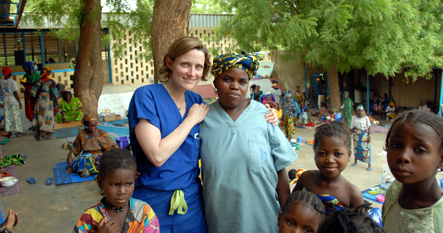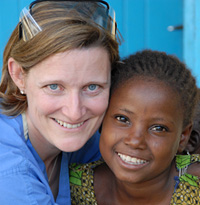By Camille Mojica Rey
When UCSF urogynecologist Sharon Knight, MD, agreed to take part in a humanitarian mission to what the United Nations has called the poorest country on Earth, she expected that the medical treatment she delivered to the women of Niger would change their lives for the better.
What she didn't expect were the things she would learn from treating the medical condition known as fistula, which had caused the women to become alienated from society and from themselves.
"These women have nothing and nowhere to go, not even home," recalled Knight, who treats patients at UCSF's Women's Continence Center (WCC).
Knight traveled to Niger with the International Organization for Women and Development, Inc. (IOWD) in May. IOWD recruits expert surgeons who volunteer to treat incontinence and other forms of urogenital problems affecting women.
 |
Sharon Knight, left, recently returned from Niger, where she helped women who suffered from an extreme form of incontinence. |
In developing countries, the lack of basic medical care during labor and childbirth leads to an extreme form of incontinence in which women constantly leak urine and, in some cases, even feces. The condition, called vesico-vaginal fistula, occurs in young women (some as young as 12 years) who have experienced a prolonged, obstructed labor. The pressure of the baby's head damages the wall between the bladder and the vagina, causing a fistula, or hole, to develop, which in turn causes the leakage of urine.
It is not uncommon for Nigerois women suffering from this condition to be shunned by their family, friends and neighbors. Despite their physical suffering and social ostracism, Knight found the women she treated during her two-week stay to be incredibly resilient. "Just to see them laugh and smile was an amazing thing," she said. "I really learned something about the capacity of the human spirit."
Knight was also surprised by the severity of the cases she saw. "You just don't see anything so extreme in this country, where women have access to basic care," she said. In 11 days, the IOWD team of nine physicians examined 120 women and performed 53 surgeries.
Using her skills to successfully treat these patients gave Knight the satisfaction of knowing she had helped these women. "I also learned things there that will help me take better care of my patients here," she said.
 |
Sharon Knight in Niger. |
Although her work in Niger was a life-changing experience, Knight said, "We all hope for the day when our services there are no longer needed."
Closer to Home
Ironically, less than half of the estimated 11 million women in the United States suffering with some form of incontinence seek medical help for their problem. Our society may not ostracize these women, but those who do not seek medical help often isolate themselves, said Jeanette Brown, MD, director of the WCC.
"Rather than talk to their doctors, women with incontinence will stop going for walks with friends or avoid spending nights away from home. It can really impact their quality of life," Brown said.
Located 2356 Sutter St. in San Francisco, the WCC is a multidisciplinary practice that incorporates physicians from gynecology, urology, and colorectal surgery to provide expert, timely, and innovative care for patients. Each provider has specialized expertise in the evaluation and treatment of women with incontinence. The center also has a pelvic floor rehabilitation program that offers individualized services to women with incontinence using behavioral therapy, pelvic floor exercises, and biofeedback.
Brown and other WCC physician-researchers are actively pursuing better ways to treat incontinence, as well as trying to understand how diseases like obesity and diabetes lead to incontinence in women.
According to Brown, the biggest misconceptions that women have are that incontinence is an inevitable part of aging and that it can only be treated surgically. "Incontinence is not normal," she said. "The good news is that we have many treatment options - most of which are nonsurgical."
Urinary incontinence is the inability to control urination.While the chances of developing incontinence increase with age and childbirth, it can occur in young, childless women, as well. The most common types of incontinence are stress incontinence, urge incontinence (often called overactive bladder) or a combination of both, called "mixed incontinence." The center also specializes in treating women with pelvic support problems, or prolapse, and bowel incontinence.
Most cases of urinary incontinence can be treated with WCC's comprehensive pelvic floor rehabilitation program, behavioral changes, physical therapy or medication. Surgery is usually a treatment of last resort, Brown said. "Once we have a proper diagnosis, we help women find the solution that is right for them," she explained.
Both Brown and Knight stressed that women need to feel empowered to discuss incontinence among themselves and, more important, with their physicians. "We want women to get the idea that incontinence is not normal," Brown said. "They don't have to live with it and we can do things to help."
For more information on incontinence and the UCSF Women's Continence Center, visit
call 415/885-7788 or toll free at 877/DON'T LEAK.
Related Links:
UCSF Women's Continence Center





